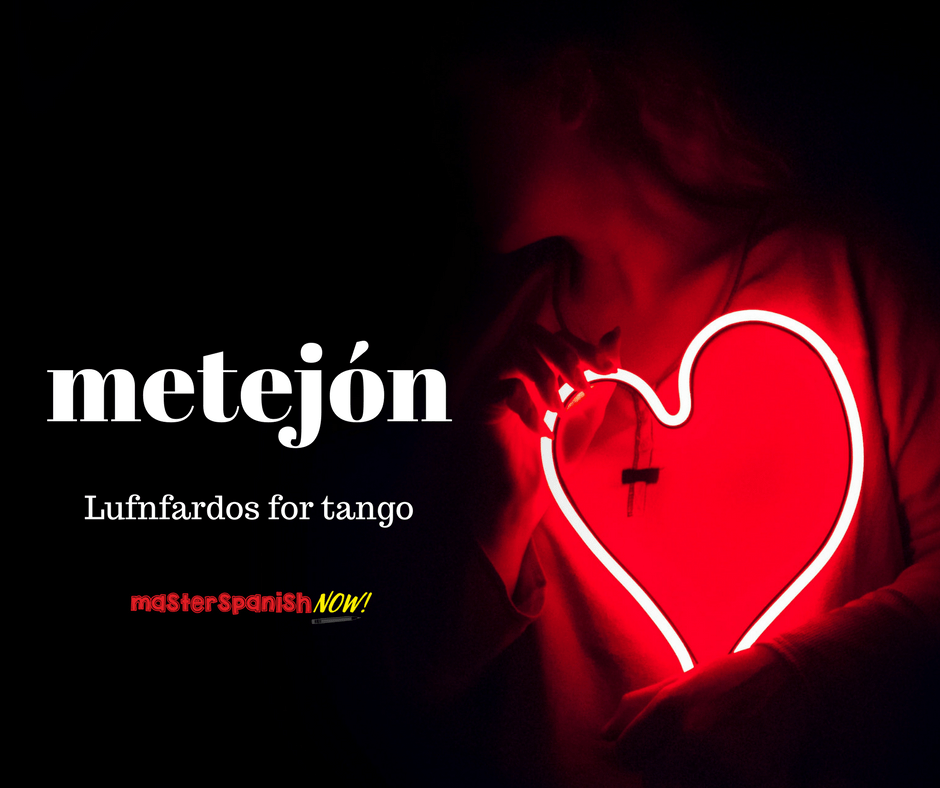After our last Lunfardos blog post (7 Lunfardos for Tango (Part 1)), we have received a lot of requests for more Lunfardo words. So here you go our second collection of 7 essential Lunfardo words for tango, enjoy!
1. Metejón

Metejón means a crush or a crazy love.
“Milonga sentimental”, a popular milonga song, tells a story of a man who went to a milonga and thought about his lover that had left him. The lyrics describe how he was mad in love and crushed by her betrayal:
“Pero no es fácil cortarse
(But it is not easy to cut off)
los tientos de un metejón
(tentacles of a crush)
cuando están bien amarrados
(when they are tightly attached)
al palo del corazón”
(to the carcass of the heart)
Listen to “Milonga sentimental” by Orquesta Canaro and singer Ernesto Fama here:
2. Bombón
The Spanish word “bombón”, as you can probably guess, refers to candy, especially those that are coated with chocolate. In Argentina the word carries the double meaning of an attractive man or woman or a sweetheart.
In this beautiful song “bomboncito”, the lyricist poured out his heart and expressed without hesitation how his “bomboncito”, his little sweetie has taken his heart totally, and how her love does wonder to his life.
Dejame
(Let me)
que te diga despacito
(let me tell you slowly)
bomboncito… bomboncito…
(my little sweetie… my little sweetie…)
dueña de mi corazón.
(owner of my heart.)
Una vez más mi emoción
(Once again my excitement)
repetirá la canción
(will repeat the song)
milagro de tu amor
(miracle of your love)
y de mi amor
(and of my love.)
Listen here the song Bomboncito interpreted by Orquestra Salamanca and singer Armando Guerrico here
3. Afilar
The standard meaning of the word you would find in the dictionary is to “sharpen”, for example, Juan afila sus lápices (Juan sharpen his pencils).
However, in Lunfardo, the word takes on another meaning: to be in love (enamorar), or to court someone (cortejar).
Example: Pablo afila con esa mina pero no es muy serio.
(Pablo is courting that woman but he isn’t that serious.)
4. Botón
“Botón” in Lunfardo means police or guard. Legend has it that Lunfardo is a secret language invented by the street gangs in Buenos Aires so that the “botón” would not understand what they are saying.
5. ¡Aire!
Aire means air, but if someone at Buenos Aires says to you in a milonga “¡Aire!”, he may actually be telling you to get out from there immediately, as “¡Aire!” in Lunfardo carries the meaning of “¡Afuera!, márchate, vete” (Leave now!).
An interesting fact here to note is that the literal meaning of “Buenos Aires” is “Good air”.
6. Amarguear
As you would probably know, mate is a big part of Argentine culture, and the Lunfardo word “Amarguear” refers to the action of taking a mate (tomar mate), and more precisely, mate without sugar, as the word is very likely formed based on the adjective “amargo” (bitter).
7. Chorro
“Chorro” (or “choro”) means thief, and “chorear” is the verb form of the act (to steal).
The tango song “chorra” is about a man who was tricked by the lie of his lover, and in 6 months he went bankrupt and lost everything he earned from his hard work, so in the song, the man called his past lover a “chorra”:
“En seis meses me fundiste el mercadito,
(In six months you bankrupted my little market,)
la casilla de la feria, la ganchera, el mostrador…
(the stand at the fair, the hooks, the counter…)
¡Chorra!
(Thief!)
Me robaste hasta el amor…”
(You even stole my love…)
Listen to this song by the Orquesta Alfredo de Angelis here
Interested in learning Spanish for a deeper understanding of tango culture? Check out our Tango Spanish course by our Argentine Spanish teachers who are tangueras from Buenos Aires!

